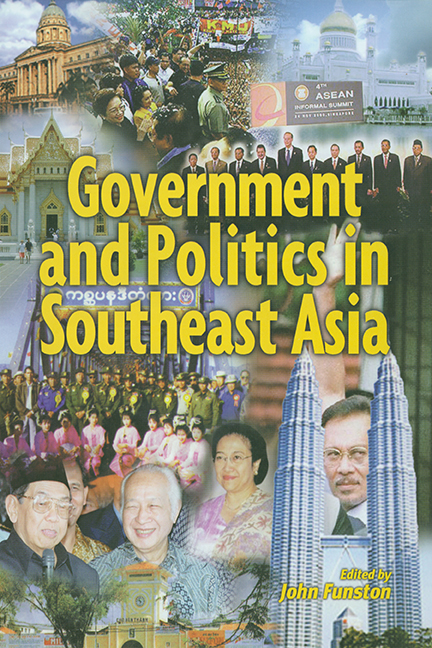6 - MYANMAR
Military in Charge
Published online by Cambridge University Press: 21 October 2015
Summary
INTRODUCTION
Myanmar is perhaps the most controversial country in Southeast Asia. The legitimacy and the authority of the ruling junta have been contested since its inception in 1988, not only by the legally constituted political opposition and a constellation of illegal or unlawful organizations, insurgents and expatriate groups, but also by some Western states and non-governmental organizations as well. Even its name is in dispute — many foreigners and expatriates prefer Burma, the accepted designation from colonial times until changed by the junta in June 1989.
Myanmar nation-building began around the 11th century with the establishment of Bamar (formerly known as Burman) hegemony over other indigenous “nations”, but was interrupted by British conquest, completed in 1885. The traditional concept of dynastic rule and legitimate authority goes back much further in time and was influenced by Buddhist and Hinduistic concepts of leadership. Despite personalized rule, a tradition of righteous kingship guided by moral and ethical codes of conduct served as a counterbalance to despotic tendencies of absolutist rule.
When the country was governed as a province of British India “Burma Proper” was separated from the “frontier areas” (half the country comprising the Arakan hill tracts to the West and the hill areas bordering China, Laos and Thailand in the North and East) by the colonial administration. The latter came under indirect rule, whereby local ethnic chieftains were allowed to maintain their power and status. Thus an opportunity for the indigenous nationalities to develop a sense of belonging and bonding culminating in an “imagined community” that could forge a modern nation-state out of disparate ethnic nations was lost.
- Type
- Chapter
- Information
- Government and Politics in Southeast Asia , pp. 203 - 251Publisher: ISEAS–Yusof Ishak InstitutePrint publication year: 2001



